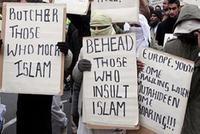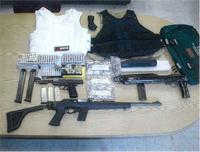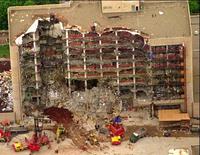-
The killing of OBL: from enhanced interrogations to presidential speech writing
Four quick points: first, there is little doubt that the information obtained by U.S. intelligence about the people in the different circles surrounding Osama bin Laden — information that finally allowed the United States to follow the route of one of OBL’s couriers all the way to OBL’s hideout — was obtained without reading the Miranda right to those interrogated and without advising them of their right to remain silent; second, was the invasion of Iraq a diversion from the hunt for OBL? Third, the war against terrorism is not a war over territory and assets; it is a war over symbols, psychology, perception, and public opinion; killing bin Laden from the air by bombing his compound would have achieved the same physical results, but not the same psychological results; fourth, on the prose and poetry of leadership
-
-
Bin Laden's killing: intriguing questions, few answers
The brilliant operation conducted by the U.S. Navy SEALs to kill Osama bin Laden should be celebrated, but the information provided so far by the administration leaves many questions unanswered; one of them has to do with Pakistan: it is inconceivable that bin Laden and his entourage could have stayed in their ostentatious compound for five years without elements in the Pakistani security services protecting them; it is bad enough for Pakistan to train and support several local Islamist terrorist groups so that they do Pakistan’s bidding in its conflict with India; it is another thing altogether for Pakistan to help hide the leader of a movement that declared war on — and has pursued active acts of war against — the United States, and do so while receiving billions of dollars in aid from the United States; we typically use the adjective “ambivalent” to describe Pakistan’s attitude toward the war on Islamic terrorism; perhaps it is time to search for another adjective; there are also some intriguing questions about the operational aspects of the raid on bin Laden’s compound
-
-
U.S. commandos kill Osama bin Laden
In a brilliant commando operation deep inside Pakistan, a Navy Seal team killed Osama bin Laden then took his body to an American military base in Afghanistan for DNA verification of his identity; the DNA matched; the operation got underway last August when information was gathered showing bin Laden hiding in a compound in a small Pakistani town 150 km north of Islamabad, Pakistan’s capital; President Obama gave the go-ahead to the operation on Friday, 29 April; in addition to Bin Laden, three other men were killed in the operation, including one of Bin Laden’s sons — and a woman who was used by the men as human shield
-
-
U.K. universities accused of being "hotbeds of Islamic extremism"

British universities have been accused of being fertile breeding grounds for violent extremism; a recent investigation by British MPs claims that Islamic fundamentalism has flourished at universities and school officials have done little to stop it; school officials have denied these charges and insist that the report is entirely lacking in factual evidence; university vice-chancellors said the parliamentary report conflates the fact that young people are susceptible to radicalization and that a very large percentage of young people in the United Kingdom attend universities
-
-
247 on U.S. terror watch list bought guns, explosives in 2010

There are eleven reasons why an individual may not be able to buy firearms or explosives in the United States — for example, being a convicted felon or an illegal immigrant; those on the U.S. terror watch list, however, are free to buy firearms and explosives; according to the FBI, in 2010 247 of them did — a similar number to that of 2009; some lawmakers want the attorney general to be able to prevent an individual on the watch list to buy a gun, but the counterargument is that the list is not always accurate, and that the attorney general is a political appointee; moreover, the list is secret, and letting people know they are on it may complicate the ability of law enforcement to track them and their associates
-
-
2002 Color-code terror alert system, RIP
On 26 April a new terrorist alert system — the National Terrorism Alert System (NTAS) — will go into effect, replacing the color-code alert system which has been in effect since 2002; the new system will include “imminent threat” and “elevated threat” alerts; the “imminent threat” alert will warn of a credible, specific, and impending terrorist threat against the United States; in some cases, alerts will be sent directly to law enforcement or affected areas of the private sector
-
-
Secret bomb-proofing building design posted on the Web

The Pentagon is building two towers in Alexandria, Virginia, to house 6,400 personnel; the Army Corps of Engineers inadvertently posted the bomb-proofing specifications for the new buildings on the Web; experts say this will allow terrorist to learn how to circumvent the building defenses; there is another problem; the documents reveal that the specifications call for the building to be designed to resist threats posed by vehicle bombs detonated outside the building’s security perimeter carrying the equivalent of 220 pounds of TNT; experts say this is not enough; Timothy McVeigh used 4,000 pounds of TNT in Oklahoma City in 1995; the 1993 attempt on the World Trade Center involved 900 pounds; the attack on the Marine barracks in Lebanon in 1983 involved 12,000 pounds of TNT
-
-
Rorschach test for terrorists

DHS wanted to test a Russian mind-reading technology which worked, more or less, like a Rorschach test for terrorists; developers of the method insisted that the technique was sound and objective; it is not clear what happened with the research work and whether or not it has yielded any practical results; neither the agency nor the institute contracted to do the work issued follow-up information
-
-
Violence sharply up in Pakistan

A new report says more than 2,500 people were killed in militant attacks in Pakistan in 2010; nearly half of victims were civilians killed in suicide blasts. There were 67 such attacks last year; at least 900 people had been killed in U.S. drone strikes during the same period; the number of people killed by the army is not mentioned, but it estimated to be in the region of 600-700; 1,713 people had been killed by militants over the preceding eighteen months (2008-09), while 746 people had died in drone attacks during the same period; the report highlighted a growing spread of hate literature and said it had been monitored that in the mainstream Urdu newspapers 1,468 news articles and editorials promoted hate, intolerance, and discrimination against Ahmedis
-
-
Pakistan asks U.S. to reduce covert presence in country

In a move which is going to hamper the U.S. ability to operate effectively against militants in Pakistan, Pakistan has let it be known that it wants about 335 U.S. personnel, CIA officers and contractors, and special operations force personnel to leave Pakistan; this would account for 25-40 percent of CIA staff in the country; tension between the two countries has been rising for a while, and it came to a head earlier this year when a CIA operative panicked during a covert operation and killed to innocent bystanders; the operative was released after the two families, who received $2.3 million in blood money from the CIA, asked the court to let him go; the Pakistani government, however, wants the U.S. covert footprint reduced and covert activity, including the use of drones, curtailed
-
-
U.S. to reconsider use of drones in Pakistan
In the last twenty-four months, U.S. drones have killed some 1,000 militants — but also about 600 civilians; in an effort to shore up fraying relationship with Pakistan, the U.S. ambassador to Pakistan said the United States would examine the continued use of drones in the war against the militants; Pakistani prime minister Asif Ali Zardari said the drone war has destabilized Pakistan and made political and economic reforms more difficult to accomplish
-
-
Rebels may sell missiles to finance campaign
In a congressional testimony, General Carter Ham, commander of the U.S. Africa Command, underscored the threat from shoulder-fired missiles looted from Libyan arms depots; Gen. Ham estimated that 20,000 of these missiles may have been in Libya at the time of the uprising; carried and fired by a single fighter, these missiles travel at supersonic speeds from a shoulder-fired launcher toward the heat signature of an aircraft engine, where they detonate
-
-
Tighter security rules keep suspects from flying
Following the 2009 Christmas Day bombing attempt, security rules were tightened on U.S.-bound flights; these rules now prevent not only known terrorists from boarding such flights, but also those who received weapons training, recruited others, fought against American troops, or help finance terrorist organizations; since the end of 2009, more than 350 people were prevented from boarding U.S.-bound flights
-
-
Inviting terror targets in New York City poorly guarded
A list of Port Authority facilities especially vulnerable to terrorist attacks inadvertently released; the list contains some of the most heavily trafficked bridges, tunnels, and transit hubs in the world
-
-
Milwaukee studying Israel's homeland security practices
This week, Milwaukee County Sheriff David Clark along with about a dozen other police chiefs and county sheriffs are visiting Israel to study the country’s homeland security tactics; American law enforcement officials will learn more about Israeli practices in airport security, intelligence analysis and sharing, mass casualty management, and bomb disposal practices; the trip began on 10 April and will conclude on 16 April
-
More headlines
The long view
What Does Netflix’s Drama “Adolescence” Tell Us About Incels and the Manosphere?
While Netflix’s psychological crime drama ‘Adolescence’ is a work of fiction, its themes offer insight into the very real and troubling rise of the incel and manosphere culture online.
